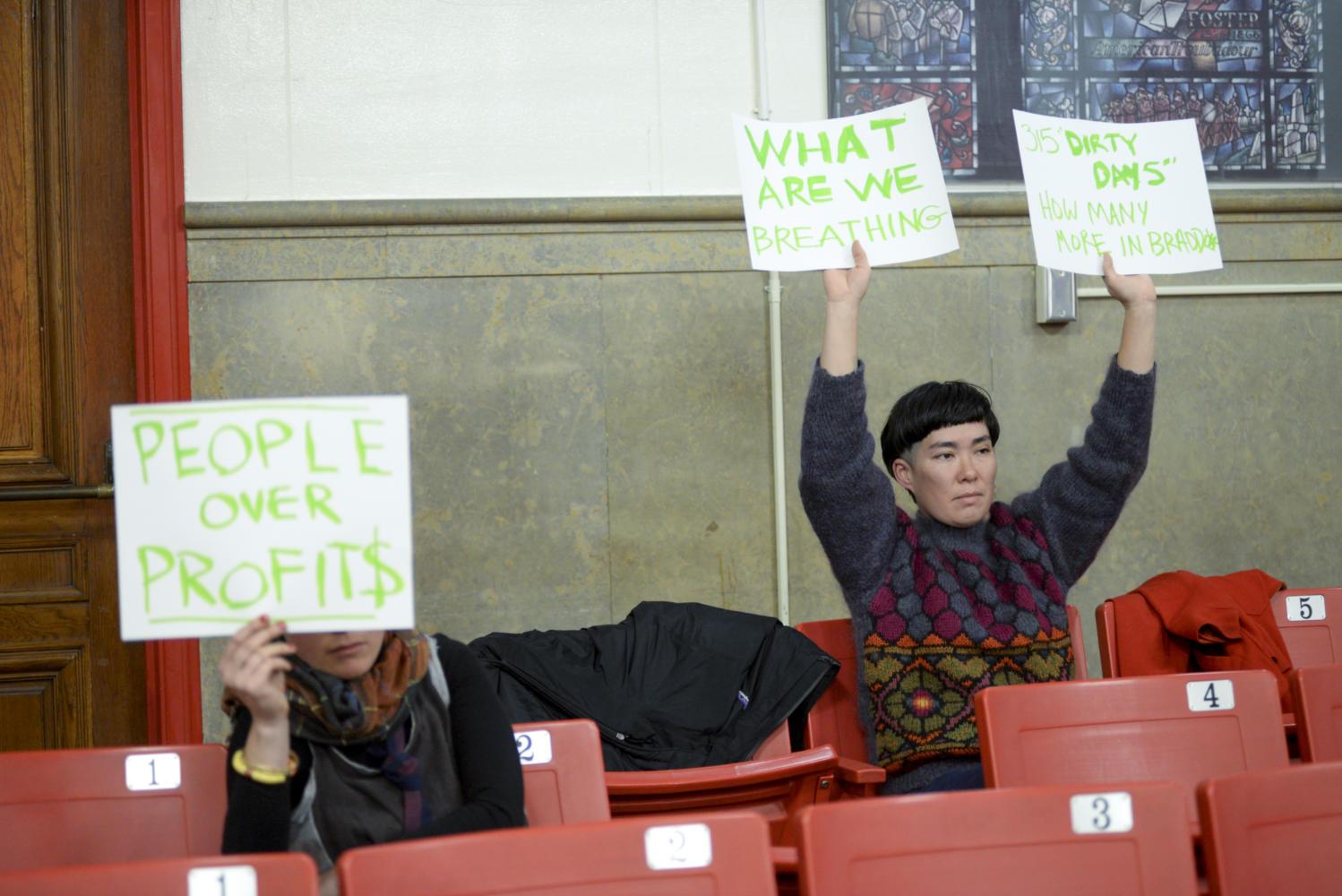When environmental groups overstep, progress halts


Ginger Brooks Takahashi (right) protested during the Lawrenceville Steel Foundry Public Hearing Monday night at Arsenal Middle School. (Photo by Aaron Schoen | Staff Photographer)
The auditorium of Arsenal Middle School contained an eclectic mix of people Monday night. In the middle aisle, a sharply dressed younger crowd in scarves and thick-rimmed glasses conversed with representatives from environmental groups such as PennEnvironment and Lawrenceville United. Meanwhile, gruff, blue-collar men covered head to toe with soot sat on the outside.
They were there for a public hearing about a draft operating permit that would allow McConway & Torley, a steel foundry located in Lawrenceville, to continue operating at their current capacity. Workers at M&T gave testimonies about the importance of continuing the operation of the steel foundry, where molten metal is poured into casts to make steel, arguing the plant gives the workers meaningful, well-paying employment.
Many in the middle disagreed, which was apparent from the number of shaking heads. Anna Reiff, a resident of Braddock, sat in the back with a handwritten sign that read, “People over profit$.” At the end of the hearing, she walked up to the microphone at the front of the room, sign in hand.
“I wish it was not about jobs versus the ability to breathe,” she said, looking to the steel workers. “But I need to breathe.”
The scene at Arsenal Middle School saw the national debate about environmental regulations play out in miniature — just two miles away from Pitt’s campus. It was a clash between environmentalism and economic growth.
But this is not a case of runaway industrialism that needs to be roped in by white knight, grassroots environmental organizations. This is a case of environmental justice unfortunately posing unscientific resistance to an organization that both builds community and follows federal guidelines — a resistance that damages the reputation of pro-environmental groups and promotes the lie that environmental advocacy stifles economic growth.
It’s important to understand the facts of this case. The Allegheny County Health Department previously proposed a draft operating permit to M&T in 2015, which would have cut their steel production by roughly 80 percent. They justified this harsh decrease by citing concerns about negative impacts on air quality that would result from continuing operation at full capacity.
A steel foundry like M&T can release many harmful substances into the air. Data collected in 2015 from nearby air monitors suggested the company was near the regulatory thresholds for lead, manganese, hexavalent chromium and benzene.
These substances are dangerous in high concentrations. Lead and manganese both have the potential to cause neurological damage, while hexavalent chromium and benzene are highly carcinogenic. Because of the danger these substances pose, public health experts have set regulatory limits. For example, airborne manganese concentrations are limited to a hard maximum of 300 nanograms per cubic meter.
M&T did violate the strictest standards on manganese emissions. According to the EPA, prolonged exposure to manganese concentrations more than 50 nanograms per cubic meter can pose a health risk. Data from air monitors in the area show average concentrations around 60 nanograms per cubic meter in 2015, but preliminary results discussed during the hearing show that the average has dropped to 35.
On the whole, M&T has largely complied with health standards. Expert testimony from Lisa Bailey, Ph.D., a senior toxicologist at Gradient Corp., said the substances M&T releases “do not pose a risk to human health.” She noted the levels of hexavalent chromium and lead were well below federal limits, and also remarked that industrial sources of benzene are negligible when compared to automobile emissions, which alone account for 48 percent of all benzene emissions in Allegheny County.
This is readily available data. For these four pollutants of concern, it’s clear that M&T complies with federal standards. Despite this, environmental groups continued to protest the permit.
These groups further hurt their case through misrepresentation and misinterpretation of the facts Monday night. Spokespeople noted their concerns about sporadically high air toxic concentrations, poor air quality in Allegheny County and nearby odor complaints — all of which are either unfounded or irrelevant to the M&T debate.
They first cited spikes in manganese concentrations. According to an ACHD air quality report, manganese concentrations around M&T averaged around 60 nanograms per cubic meter, maxing out at 500. But these spikes don’t pose a public health risk, at least according to an EPA policy requiring only annual reporting of manganese averages because only prolonged exposure causes damage.
The protestors also cited statistics from the American Lung Association that Allegheny County has the 12th worst air quality in the country. But the EPA protocol for determining air quality in a region is to take the worst air quality across all monitors in the area. One of the monitors in Allegheny County is in Clairton, immediately downwind of the largest coke factory in the country — and as a 2015 report by the Allegheny County Health Department stated, Lawrenceville’s monitor is situated upwind of the factory, meaning while the problem certainly affects Clariton, the results of the ACHD study in Clariton aren’t entirely applicable to Lawrenceville.
Finally, protesters noted the bad, industrial smells that wafted throughout Lawrenceville on Sunday, stating that anyone in the vicinity would have complained. But M&T isn’t even open on Sundays, something a worker humorously pointed out.
This isn’t intended to demonize the environmental groups. The work they do has improved public health in Pittsburgh.
This is also, in no way, an argument in favor of eliminating environmental protections. These caps on emissions ensure the preservation of public health and must remain in place to protect the environment against increasingly aggressive attacks from the federal administration.
It’s an argument in favor of unbiased, scientific analysis of the facts. Environmental advocacy and economic growth can coexist — one does not necessarily threaten the other.
Ray Tedford is the vice president of the western Pennsylvania branch of Schust Engineering, the company that provides ventilation equipment for M&T. He said that M&T has been the beating heart of Lawrenceville since 1868 — it’s the reason the community is thriving now.
“We are good environmental stewards,” he said. “Why punish those who meet regulations?”
Brian primarily writes about politics and the environment. Write to Brian at briangentry@pitt.edu.
Recent Posts
A Good Hill to Die On // The motivation we all need
In this post of “A Good Hill to Die On,” staff writer Sierra O’Neil discusses…
Who Asked? // Is it really the damn phones?
This installment of Who Asked? by staff writer Brynn Murawski describes her brief journey limiting…
Students are ‘upset, but not surprised’ over denial of gender affirming care at UPMC CHP
Pitt students and LGBTQIA+ members express their concerns about the recent denial of gender affirming…
Take Madness Final Four | Battle of Pennsylvania, 412 and Just Outside of Philly clash
Welcome to the Final Four of Take Madness! We are down to four talented writers,…
Column | Best Sports Environments in Pittsburgh
Pittsburgh is undoubtedly one of the best sports cities in America. A deeply passionate fanbase…
Chalk is all the talk: Previewing the NCAA men’s Final Four
For the first time since 2008, all four first seeds have made the men’s Final…

